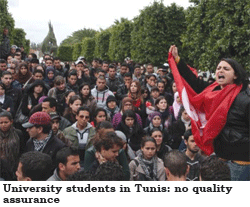More than ever before, universities are being measured against not only national competitors but also rivals from around the world. There are already a number of well-established global university league tables, which are generally based on research power.
Then there is the Assessment of Higher Education Learning Outcomes project, a scheme run by the Organisation for Economic Cooperation and Development (OECD), which in a 2012 pilot assessed the critical thinking and reasoning skills of 23,000 undergraduates across 17 countries in an attempt to discover what (if anything) students actually learn at university.
 Now, the Herculean task of comparing the world’s universities has been extended into the realm of governance — how they are run, what their goals are, whether they are autonomous from the state and the extent to which they are accountable to wider society.
Now, the Herculean task of comparing the world’s universities has been extended into the realm of governance — how they are run, what their goals are, whether they are autonomous from the state and the extent to which they are accountable to wider society.
In June this year, the World Bank published a report, Benchmarking Governance as a Tool for Promoting Change: 100 Universities in MENA Paving the Way, which measures the governance structures of 100 universities in the Middle East and North Africa (MENA) region. Public and private higher education institutions in Morocco, Algeria, Tunisia, Egypt, Lebanon, Palestine and Iraq were surveyed. “It’s the first time an exercise of this sort has been done,” says Adriana Jaramillo, a senior education specialist at the World Bank who led the team that produced the report. “It has great potential.”
The region has notoriously high unemployment levels for tertiary education graduates running at 19 percent in Egypt in 2010, for example. Yet few universities surveyed in this study tracked how many of their graduates landed a job, how long it took them to find work, or their average salaries, says the report.
For example, in Algeria (where in 2013 unemployment is about 20 percent, according to the report) less than 10 percent of universities monitored employment outcomes. There is also “very low” levels of participation by businesses on university boards, the report warns, something that could be stopping institutions from redesigning their courses to make students more employable.
In Algeria, Morocco and Tunisia, about a quarter of institutions surveyed were found to have no quality assurance system in place. No one country does consistently well or badly across all five measures of governance. Palestine and Lebanon, for example, score comparatively highly for autonomy but poorly on the clarity and implementation of their institutional mission and goals.
Lack of government funding and tight central control has sometimes been blamed for the underperformance of universities in the region. But “some of these institutions don’t need (extra) resources” or permission from the state to do things differently, says Jaramillo. What is needed is a “change in the mindset… getting them to think ‘we actually have a responsibility’” to students and must “give courses that are useful for these kids”, she adds.
The reaction to the report in the MENA region has been very good, she says, and there has been interest in a similar project from institutions in sub-Saharan Africa, Southeast Asia and South America. Jaramillo’s ultimate “vision” is to compare university governance worldwide.
Even more ambitiously, she would like to use global data to see whether certain governance models lead to better results in teaching, research or graduate employment. But, she admits, this idea has “no timescale, (and) no budget” and would be limited to countries with sufficiently robust data.
So it may be some time before we find the optimum way to govern a university — if, indeed, such a way exists.
(Excerpted and adapted from Times Higher Education)



























